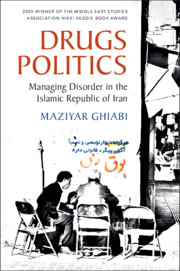Drugs Politics
Iran has one of the world’s highest rates of drug addiction, estimated to be between two and seven per cent of the entire population. This makes the questions this book asks all the more salient: what is the place of illegal substances in the politics of modern Iran? How have drugs affected the formation of the Iranian state and its power dynamics? And how have governmental attempts at controlling and regulating illicit drugs affected drug consumption and addiction? By answering these questions, Maziyar Ghiabi suggests that the Islamic Republic’s image as an inherently conservative state is not only misplaced and inaccurate, but in part a myth. In order to dispel this myth, he skilfully combines ethnographic narratives from drug users, vivid field observations from ‘under the bridge’, with archival material from the pre- and post-revolutionary era, statistics on drug arrests and interviews with public officials. This title is also available as Open Access on Cambridge Core at 10.1017/9781108567084.
maziyar ghiabi is an Italian/Iranian social scientist, ethnographer and historian, currently a lecturer at the University of Oxford and Titular Lecturer at Wadham College. Prior to this position, he was a Postdoctoral Fellow at the Paris School of Advanced Studies in Social Sciences (EHESS) and a member of the Institut de Recherche Interdisciplinaire des Enjeux Sociaux (IRIS). After finishing his BA and MA at the University of Ca’ Foscari Venice, he obtained a Doctorate in Politics at the University of Oxford (St Antony’s College) where he was a Wellcome Trust Scholar in Society and Ethics (2013–17). His interest falls at the crossroads of different disciplinary and intellectual fields, from medical anthropology to politics to modern social history across the Middle East and the Mediterranean. He is the editor of Power and Illicit Drugs in the Global South (Routledge, 2018).

